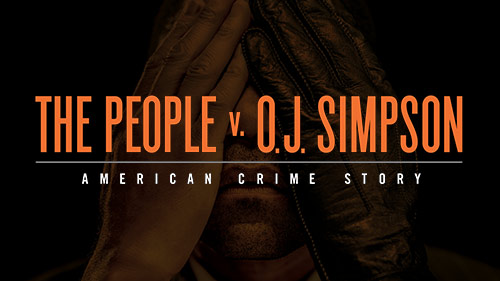The Fresh Lens Of ‘The People v.s. O.J. Simpson’ Exposes The Same Societal Ills

April 5, 2016
(PHOTOS)
By Libby Hill
Los Angeles Times
(TNS)
“American Crime Story: The People v. O.J. Simpson” should have been an unmitigated disaster.
Let’s start with the fact that the 10-episode FX series practically ignores the horrific crime at the heart of the so-called trial of the century. It treats the double homicide of Nicole Brown Simpson and Ronald Goldman as a piece of pop culture, giving more airtime to Kim Kardashian and her siblings than to the families of the murder victims.
And yet what at first seemed little more than a campy retelling of the trial that transfixed the nation in 1995 has become its own cultural artifact, one that has drawn in a new generation of TV viewers mesmerized by the cast of characters who made their cases for and against Simpson before Superior Court Judge Lance Ito.
The series, which has its finale airing Tuesday night, crafts dramatic tension by inverting audience expectations. Using history as horror, “The People v. O.J. Simpson” drops references that spur dread in viewers familiar with the case — when we meet Mark Fuhrman, when Marcia Clark wants a haircut, when trying on gloves is contemplated. The tension comes not in wondering what will happen next, but in knowing for certain what the future holds.
There has been a move in pop culture to fixate more and more on “real life,” even beyond those realities offered by Beverly Hills housewives. Audiences grow increasingly fascinated by television shows and podcasts fueled by tales of true crime, wanting to watch narratives spool out, like poorly written Agatha Christie knockoffs.
But too often in the true crime genre there is a tendency to lose the forest for the trees. People want the thrill of knowing the events they’re seeing really happened, but they cannot hold in their heads the idea that their entertainment comes at the cost of someone else’s life.
It’s a great irony, then, that “The People v. O.J.” exists as the photo negative of reality television. It takes the truth and dresses it as fiction and asks us to pretend that the world it portrays is not the world we still inhabit.
And so, if there’s a fallen hero within the world created in “The People vs. O.J. Simpson,” it is not the former Heisman Trophy winner and Hertz pitchman, but Robert Kardashian.
Portrayed by David Schwimmer, we meet the Kardashian patriarch as a man of faith — in his God, in his friend O.J. Kardashian wants to believe in the best of people.
Slowly, throughout the investigation and trial, his faith is broken down, until, in a taut scene featuring Kardashian rummaging through Simpson’s infamous garment bag — long-rumored to contain the murder weapon — it seems likely that Kardashian is not looking to exonerate his friend, but to find evidence that will condemn him.
By the end of the series it’s clear that Kardashian deeply regrets his involvement in the case, admitting to ex-wife Kris that once the trial is over, Simpson will be out of their lives forever. “It’s hard enough,” he says, “with half the country hating you.”
The irony, of course, is that just four years after his 2003 death by cancer, Kardashian’s surname would become the calling card for reality television’s most controversial dynasty.
What “American Crime Story” understands, perhaps better than any show on television, is that the Simpson trial was the flap of butterfly wings that triggered the cultural and political tsunamis that still plague the country and made the Kardashians’ fame possible.
An empire built on the back of sex tapes and cellphone games, wedding sponsorships and personal brand building owes a good part of its existence to the foundation set by a nonfiction narrative that frequently pushed scripted television off the air.
Often exploitative and sleazy, like the worst of future reality shows, the Simpson trial became appointment TV for an audience that found itself transfixed by every stomach-churning twist. That it was ostensibly real life seemed to only deepen the passions inflamed by the events, leaving a media desperate to provide enough content to feed the beast.
The explanation for the phenomenon was addressed in the “Conspiracy Theories” episode when Alan Dershowitz (Evan Handler) instructs his Harvard law class that, “You need to provide a narrative, not just in the courtroom; in the world” before saying, “Look at what the culture is becoming. The media, they want narrative too. But they want it to be entertainment.”
It’s a meta moment in a television series filled with them.
Clark (Sarah Paulson) serves as the crusader at the heart of “American Crime Story.” But as the series unwinds we see the cost of her mission to see a guilty party punished appropriately.
In the episode “Marcia, Marcia, Marcia,” Clark is not only bullied by the press into a disastrous makeover but tortured by both of her exes, lambasted in the press as a bad mother, exposed in the tabloids with nude photos and mocked in open court because of the demands of child care. At the end of the episode she weeps, defeated, to Christopher Darden (Sterling K. Brown), “I’m not a public personality. I don’t know how to do this.”
Clark isn’t the only woman savaged by American culture within the confines of the trial and the series doesn’t shy away from any of it. Ito’s wife, Peggy York, is the subject of extensive gender and revulsive insults within the Fuhrman tapes after she served as the detective’s supervisor.
Even Nicole Brown Simpson can’t remain untouched by the tinges of the idea that perhaps she did something to bring her fate upon herself with individuals finding it all too easy to look past the idea that the domestic violence she had suffered at the hands of O.J. in some fashion predicated her fate. The Violence Policy Center reports that in 2013, of all women killed by men, 94 percent knew the perpetrator, and 62 percent were wives or intimate acquaintances of their killers.
But men weren’t immune from being thrust into narratives from the trial that they couldn’t control. It’s just that, to borrow from Dershowitz’s language to his students, they were better at being the ringleader of the media circus.
Johnnie Cochran (Courtney B. Vance) as depicted by “American Crime Story” understands the way the world works better than just about anyone. A complex man, driven by equal parts Christian charity and vanity, Cochran intuits the prosecution’s actions before they do, understands the perceptions of the jury before they can and generally luxuriates in the fact that he’s unquestionably the smartest person in the room.
But the series is careful to illustrate how Cochran’s brilliance isn’t enough to effortlessly free Simpson, as the lawyer’s true opponent isn’t Clark or the court or even public perception; it’s America’s institutionalized racism.
For all his insight and acumen, Cochran still fell victim to perceptions centered on the color of his skin. In “The Race Card” episode we see a flashback in which Cochran is pulled over by an unwitting LAPD officer who handcuffs the assistant district attorney in front of his daughters.
Race was always going to be central to the story “American Crime Story” was telling, but it’s difficult to say if the producers had any idea just how resonant the themes of the Simpson trial would remain in these modern times.
In “Manna From Heaven,” the Dream Team receives word that Ito is disallowing the inclusion of Fuhrman’s inflammatory recordings, outside of proof that he perjured himself while on the witness stand. It’s a decision that enrages Cochran, undermining his argument that the detective and LAPD potentially falsified evidence to strengthen their case.
He rages and co-counsel Robert Shapiro (John Travolta) tries to soothe him, saying, “I’m sorry you’re disappointed. I understand everything you’re going through,” only for Cochran to assure him, “There’s no way you could understand what this is like, Bob.”
Cochran understands the plight of being a person of color in America, particularly when it comes to matters of law enforcement. What “American Crime Story” wants us to realize is that, for Cochran, and for many Americans, the trial was the continuation of a conversation that began a handful of years before with the recorded police beating of Rodney King, the acquittal of the officers involved and the riots that followed.
There was no lasting social change spurred by the trial of Simpson or the deaths of Nicole Brown Simpson and Ronald Goldman, no silver lining to senseless brutality.
“American Crime Story” set out to tell the story of the trial but, more important, to tell the story of America as it existed in that moment. It’s a recognizable place. Little has changed, even as everything has changed.







